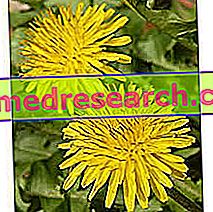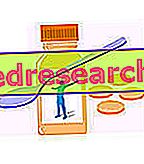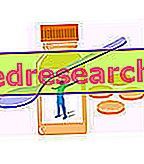
Scientific name
Taraxacum officinale
Family
Asteraceae (Compositae)
Origin
Europe, North America and Asia
Synonyms
Dandelion, shower head, small swimming pool
Used Parts
Drug consisting of leaves and roots
Chemical constituents
- Triterpenes (tarassol, tarasserol, sitosterol);
- Inulin;
- pectin;
- Phenolic acids;
- Sesquiterpene lactones (eudesmanolides and germacranolide);
- Potassium salts.
Dandelion in Herbal Medicine: Dandelion Properties
The use of dandelion as a purifier dates back to folk medicine, where it is mainly used in spring treatments to eliminate accumulated toxic substances.
Biological activity
The dandelion is ascribed digestive, choleretic, depurative and diuretic properties.
These properties are mainly attributable to flavonoids, triterpenes, sesquiterpene lactones and inulin contained within the same plant.
The choleretic action is mainly due to triterpene alcohols, synergized by sesquiterpene lactones. These - in addition to increasing bile secretion - stimulate the processes of conjugation of toxic substances, thus facilitating the elimination of metabolites harmful to the body and preventing the formation of gallstones. Furthermore, sesquiterpene lactones are bitter substances that stimulate digestion and appetite.
The diuretic activity of the dandelion is to be attributed to the presence of flavonoids, sesquiterpene lactones and potassium salts.
Inulin, on the other hand, is an oligosaccharide capable of performing beneficial actions at the gastrointestinal level, promoting the functionality of intestinal bacterial flora, improving mineral absorption and increasing fecal mass and the number of evacuations.
Furthermore, a study conducted on the dandelion root extract has highlighted its potential hepatoprotective activity, carried out through a radical scavenger action.
However, despite the various studies conducted on the properties of the dandelion, a relatively recent systemic review (2005) has stated that the clinical studies conducted to demonstrate the choleretic, diuretic and antioxidant capacities attributed to this plant are overall scarce and not sufficient to prove the reality effectiveness deriving from the use of the dandelion.
Nevertheless, the use of this plant is officially approved to treat ailments such as gastric atherias, dyspepsias, bile ducts and loss of appetite.
Dandelion against dyspeptic disorders
As mentioned, the dandelion can be used to counteract digestive disorders and to increase appetite, thanks to the properties conferred by sesquiterpene lactones, triterpenes and inulin contained within the plant itself.
Dandelion is available in different preparations and can be found in the form of dry extract, tincture, liquid extract, or as a juice obtained by pressing roots and / or leaves.
If used in the form of a tincture to counteract digestive disorders, the dose of product usually recommended is 10-15 drops to be taken up to three times a day.
For more information about the doses and methods of administration of the dandelion, we recommend that you consult the dedicated article "Treating yourself with the Dandelion".
Dandelion to promote diuresis
The dandelion is also used as a remedy to promote diuresis, above all thanks to the activity carried out by the flavonoids contained in it.
The diuretic effect of the dandelion is rather rapid, in fact, it arises after about 20-30 minutes from taking the product.
If the dandelion is used as a liquid extract 1: 1 (solvent: ethanol 25% v / v), the generally recommended dose to promote diuresis is 4-10 ml of product, to be taken up to three times a day .
Also in this case, for further information regarding the dandelion dosage to be used, please refer to the dedicated article "Treating yourself with the Dandelion".
Dandelion in folk medicine and homeopathy
The dandelion in folk medicine is not used only as a remedy against digestive disorders and to purify the body from accumulated toxic substances, but it is also used to treat other types of disorders, such as: inflammation of the urinary tract, liver and biliary tract disorders, hemorrhoids, rheumatic disorders, skin diseases and gout.
In homeopathy, however, the dandelion is used to promote slow digestion and to treat hepatobiliary disorders and constipation.
Side effects
If used at the recommended dosages, the dandelion should not cause side effects.
However, in some cases adverse reactions may occur at the gastric level. Furthermore, dandelion can cause allergic reactions in sensitive individuals.
Contraindications
Avoid taking dandelion in case of gastritis, peptic ulcer, bile duct occlusion and / or gall bladder calculi or in case of ascertained hypersensitivity to one or more components.
The use of dandelion is also contraindicated in adolescents under 12 years of age, pregnant women and breast-feeding mothers.
Pharmacological Interactions
- effect summations with NSAIDs, bitters, diuretics and hypoglycemic agents;
- lithium: lithium toxicity may increase due to sodium depletion due to the diuretic effect of the dandelion.



